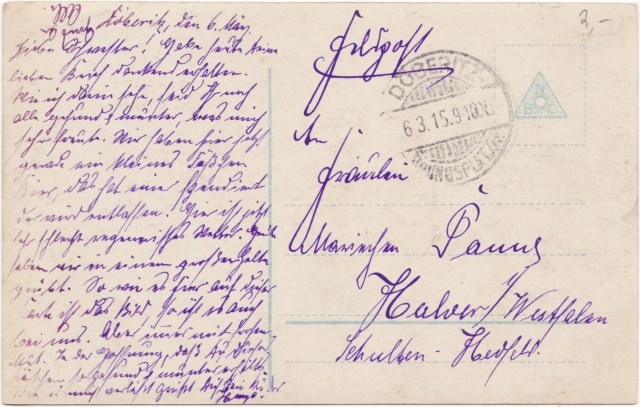‘A call roars like thunder, like the clash of swords and the pounding of waves’, or some such nonsense. You might remember that back in March 2020, as we all locked down for the first time, I began a series of posts, in daily, and later weekly, form, that featured examples from my Great War postcard collection.
The series eventually ran to sixty posts over seventeen weeks and contained a total of 230 postcards, but as all that was well over two years ago now, and as I did promise I’d show you some more one day, well, how about now? Beginning with these German ‘action’ cards, as I like to call them, the text on this one, incidentally, all about being driven by a happy spirit and striving towards the same goal. Of course it is.
This is the reverse of the same card (postmarked July 1916), and if you read the article on the Swiss Frontier in the Great War that I published a few months back (and if not, you can do so by clicking here, ‘cos it’s interesting, and it’ll open, as my links always do, in a separate browser for later perusal), you might remember that the town of Mulhouse (Mulhausen on the stamp above) saw considerable action during the first month of the war – and very little after that.
Prayers before battle (obverse above, reverse below), the card posted in November 1915.
Artillery Song, the text of which translates literally as, ‘Sometimes we’re on horseback, sometimes we’re on foot, but always with our guns, and when the hail of cartridges cracks, watch out for the black collar’. The reverse, postmarked March 1915, is once again shown below.
‘Take care, dear, and don’t forget to bring back the bratwurst and sauerkraut.’
Nooo! He forgot the bratwurst! That’s early 20th Century over-acting for you.
Three cards that I like to caption ‘Lost’,…
…’Still Lost’,…
…and ‘Must Be That Way’.
Reverse of the previous card, dated June 1917.
A card which in no way tempts me to join the King’s Grenadiers, I don’t know about you,…
…and the reverse, another postmarked March 1915.
And to finish, on the left, German troops in foreign climes, and on the right, ‘Dragoons are always helter – they have light blood – they are the fastest riders and full of high spirits’. Yet again, of course they are.

















Have you thought what to do with your collection?
There is a discussion on the Great War Forum about where our varied collections may be in the future.
https://www.greatwarforum.org/topic/264891-postcard-collection-bequeathal-to-libraries-and-museums/
Indeed I have. Over the past couple of years three fellow members of the Aldershot Military Society have died. Two were serious medal collectors, the other a lifetime collector of horse paraphernalia, and it is really only with fellow-society members help that their collections are being ‘saved’, for want of a better word. I used to think that museums were the answer, but having worked for Surrey County Council in the same department as museums (whose staff, I should say, are brilliant and work on a shoe-string), I’m sorry, no way would I wish my collections to go there! And I am no longer sure about military museums, either. I suspect they would end up in a drawer or get sold. The latest comments on the link you sent me, which I have read from top to bottom, seem to agree with me. It is a problem.
I am not sure that the King’s Grenadiers were a terribly successful unit on the evidence of that particular Postcard ! One to file under “what on earth were they thinking?”..
I always find myself wondering what happened to the senders of Postcards like these, who they were etc – have you ever managed to get translations of the writing on the back of any of them at all MF ?
Oh, me too Jon. The trouble, as Chris W pointed out last year sometime, is that it is not just a matter of finding someone who can translate German, but more specifically old High German, or even Suetterlin, which was a ‘modern’ handwriting script only introduced in 1911. Now, if you know anyone…….?
Sadly my O Level German achieved quite a few decades ago now may not be up to the job !
Would be fascinating if someone out there could manage it though..
Likewise with my German!! And wouldn’t it just.